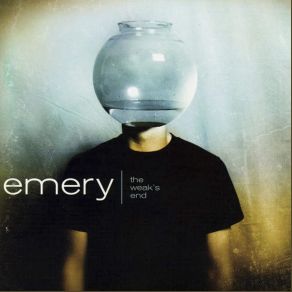The Weak's End
Download links and information about The Weak's End by Emery. This album was released in 2004 and it belongs to Gospel, Rock, Alternative genres. It contains 10 tracks with total duration of 40:43 minutes.

|
|
|---|---|
| Artist: | Emery |
| Release date: | 2004 |
| Genre: | Gospel, Rock, Alternative |
| Tracks: | 10 |
| Duration: | 40:43 |
| Buy it NOW at: | |
| Buy on iTunes $9.99 | |
| Buy on Amazon $9.49 | |
| Buy on Songswave €1.15 | |
Tracks
[Edit]| No. | Title | Length |
|---|---|---|
| 1. | Walls | 3:23 |
| 2. | The Ponytail Parades | 4:05 |
| 3. | Disguising Mistakes With Goodbyes | 3:20 |
| 4. | By All Accounts (Today Was a Disaster) (The Weaks End Album Version) | 4:06 |
| 5. | Fractions | 5:14 |
| 6. | The Note From Which a Chord Is Built (The Weaks End Album Version) | 2:28 |
| 7. | Bloodless (The Weaks End Album Version) | 4:22 |
| 8. | Under Serious Attack (The Weaks End Album Version) | 3:47 |
| 9. | As Your Voice Fades (The Weaks End Album Version) | 4:02 |
| 10. | The Secret (The Weaks End Album Version) | 5:56 |
Details
[Edit]Emery defines an extreme separation between their screaming and singing sides on Weak's End, their debut for Tooth & Nail. Opener "Walls," and the similarly-arranged "Ponytail Parades" do occasionally burst forth with hardcore-inspired screeching. But the louder, crazier moments are tightly regimented from the tracks' normal baroque and dreamy flow. The definition seems like a conscious effort to make a strong statement while still making accessible, emo-inflected music. Emery doesn't really make clear what that statement is; they prefer to suggest that it's there before drifting into opaque lyricisms that mull over personal pain and a general world-weariness. "By All Accounts [Today Was a Disaster]," "Fractions," and "Note From Which a Chord Is Built" form an ambitious midsection for the record — they're impeccably-paced mini epics, even if they don't amount to much in the end. Best might be "Under Serious Attack," which blends rousing post-hardcore emotion with weird jazzy interludes and a veritable treasure chest of reverb vocals. Those who think of Thursday or Spirit That Guides Us as wavering too much toward sonic experimentation — at the expense of songs — might like Emery's more subtle approach.